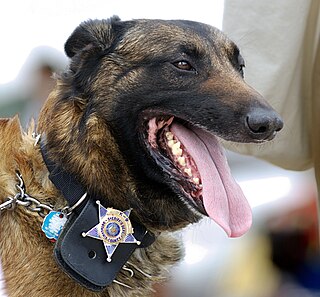
The Fourth Amendment to the United States Constitution is part of the Bill of Rights. It prohibits unreasonable searches and seizures and sets requirements for issuing warrants: warrants must be issued by a judge or magistrate, justified by probable cause, supported by oath or affirmation, and must particularly describe the place to be searched and the persons or things to be seized.
United States v. Place, 462 U.S. 696 (1983), is a decision by the Supreme Court of the United States in which the Court held that it does not violate the Fourth Amendment to the U.S. Constitution for a trained police dog to sniff of a person's luggage or property in a public place.
Katz v. United States, 389 U.S. 347 (1967), was a landmark decision of the U.S. Supreme Court in which the Court redefined what constitutes a "search" or "seizure" with regard to the protections of the Fourth Amendment to the U.S. Constitution. The ruling expanded the Fourth Amendment's protections from an individual's "persons, houses, papers, and effects", as specified in the Constitution's text, to include any areas where a person has a "reasonable expectation of privacy". The reasonable expectation of privacy standard, now known as the Katz test, was formulated in a concurring opinion by Justice John Marshall Harlan II.
California v. Greenwood, 486 U.S. 35 (1988), was a case in which the Supreme Court of the United States held that the Fourth Amendment does not prohibit the warrantless search and seizure of garbage left for collection outside the curtilage of a home.
Olmstead v. United States, 277 U.S. 438 (1928), was a decision of the Supreme Court of the United States, on the matter of whether wiretapping of private telephone conversations, conducted by federal agents without a search warrant with recordings subsequently used as evidence, constituted a violation of the target’s rights under the Fourth and Fifth Amendments. In a 5–4 decision, the Court held that the Constitutional rights of a wiretapping target have not been violated. This decision was overturned by Katz v. United States in 1967.
In United States constitutional law, expectation of privacy is a legal test which is crucial in defining the scope of the applicability of the privacy protections of the Fourth Amendment to the U.S. Constitution. It is related to, but is not the same as, a right to privacy, a much broader concept which is found in many legal systems. Overall, expectations of privacy can be subjective or objective.

Samson v. California, 547 U.S. 843 (2006), is a United States Supreme Court case in which the Court affirmed the California Court of Appeal's ruling that suspicionless searches of parolees are lawful under California law and that the search in this case was reasonable under the Fourth Amendment to the United States Constitution because it was not arbitrary, capricious, or harassing.
United States v. Martinez-Fuerte, 428 U.S. 543 (1976), was a decision of the United States Supreme Court that allowed the United States Border Patrol to set up permanent or fixed checkpoints on public highways leading to or away from the Mexican border and that the checkpoints are not a violation of the Fourth Amendment.
United States v. Chadwick, 433 U.S. 1 (1977), was a decision by the United States Supreme Court, which held that, absent exigency, the warrantless search of double-locked luggage just placed in the trunk of a parked vehicle is a violation of the Fourth Amendment and not justified under the automobile exception. The Court reasoned that while luggage is movable like an automobile, it does not have the lesser expectation of privacy associated with an automobile.
Arkansas v. Sanders, 442 U.S. 753 (1979), was a decision by the United States Supreme Court, which held that absent exigency, the warrantless search of personal luggage merely because it was located in an automobile lawfully stopped by the police, is a violation of the Fourth Amendment and not justified under the automobile exception. Similar to United States v. Chadwick (1977), the luggage was the subject of police suspicion before being placed in the vehicle.
United States v. White, 401 U.S. 745 (1971), was a United States Supreme Court decision which held that recording conversations using concealed radio transmitters worn by informants does not violate the Fourth Amendment protection against unreasonable searches and seizures, and thus does not require a warrant.
O'Connor v. Ortega, 480 U.S. 709 (1987), is a United States Supreme Court decision on the Fourth Amendment rights of government employees with regard to administrative searches in the workplace, during investigations by supervisors for violations of employee policy rather than by law enforcement for criminal offenses. It was brought by Magno Ortega, a doctor at a California state hospital after his supervisors found allegedly inculpatory evidence in his office while he was on administrative leave pending an investigation of alleged misconduct. Some of what they uncovered was later used to impeach a witness who testified on his behalf at the hearing where he unsuccessfully appealed his dismissal.

United States v. Warshak, 631 F.3d 266 is a criminal case decided by the United States Court of Appeals for the Sixth Circuit holding that government agents violated the defendant's Fourth Amendment rights by compelling his Internet service provider (ISP) to turn over his emails without first obtaining a search warrant based on probable cause. However, constitutional violation notwithstanding, the evidence obtained with these emails was admissible at trial because the government agents relied in good faith on the Stored Communications Act (SCA). The court further declared that the SCA is unconstitutional to the extent that it allows the government to obtain emails without a warrant.
United States v. Knotts, 460 U.S. 276 (1983), was a United States Supreme Court case regarding the use of an electronic surveillance device. The defendants argued that the use of this device was a Fourth Amendment violation. The device in question was described as a beeper that could only be tracked from a short distance. During a single trip, officers followed a car containing the beeper, relying on beeper signal to determine the car's final destination. The Court unanimously held that since the use of such a device did not violate a legitimate expectation of privacy there was no search and seizure and thus the use was allowed without a warrant. It reasoned that a person traveling in public has no expectation of privacy in one's movements. Since there was no search and seizure there was not a Fourth Amendment violation.
United States v. Jones, 565 U.S. 400 (2012), was a landmark United States Supreme Court case in which the court held that installing a Global Positioning System (GPS) tracking device on a vehicle and using the device to monitor the vehicle's movements constitutes a search under the Fourth Amendment.
United States v. Mendenhall, 446 U.S. 544 (1980), was a United States Supreme Court case that determined "seizure" occurs when an officer uses displays of authority to detain a person.

United States v. Graham, 846 F. Supp. 2d 384, was a Maryland District Court case in which the Court held that historical cell site location data is not protected by the Fourth Amendment. Reacting to the precedent established by the recent Supreme Court case United States v. Jones in conjunction with the application of the third party doctrine, Judge Richard D. Bennett found that "information voluntarily disclosed to a third party ceases to enjoy Fourth Amendment protection" because that information no longer belongs to the consumer, but rather to the telecommunications company that handles the transmissions records. The historical cell site location data is then not subject to the privacy protections afforded by the Fourth Amendment standard of probable cause, but rather to the Stored Communications Act, which governs the voluntary or compelled disclosure of stored electronic communications records.
Soldal v. Cook County, 506 U.S. 56 (1992), was a United States Supreme Court case in which the Court held that a seizure of property like that which occurs during an eviction, even absent a search or an arrest, implicates the Fourth Amendment. The Court also held that the Amendment protects property as well as privacy interests, in both criminal as well as civil contexts. Finally, saying that "certain wrongs affect more than a single right", the Court left open the possibility that the Fourteenth Amendment's protections against deprivation of property without due process of law may also be implicated.

Florida v. Jardines, 569 U.S. 1 (2013), was a United States Supreme Court case which resulted in the decision that police use of a trained detection dog to sniff for narcotics on the front porch of a private home is a "search" within the meaning of the Fourth Amendment to the United States Constitution, and therefore, without consent, requires both probable cause and a search warrant.
United States v. Miller, 425 U.S. 435 (1976), was a United States Supreme Court that held that bank records are not subject to protection under the Fourth Amendment to the United States Constitution. The case, along with Smith v. Maryland, established the principle of the third-party doctrine in relation to privacy rights.





